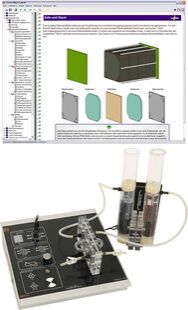Course: Fuel cells in motor vehicles

Many experts from the automotive industry and vehicle development see fuel cells as a possible solution to the fact that the range of current electric vehicles remains too limited. As a cleaner alternative to electric/petrol hybrids with their own internal combustion engine, fuel cells may be in a position to supply electrical energy on the basis of two inexpensive and readily available substances. However, for automotive mechatronics engineers, fuel cells represent a new and hitherto untried technology, for which maintenance and diagnostics will need to be learned. This course provides the necessary knowledge and understanding of the way that such fuel cells work and how they are put together. In addition, numerous experiments and measurements on an authentic fuel cell enable trainees to gain the practical experience and diagnostic skills required for dealing with this technology.
Includes
Experiment panel with:
- PEM double fuel cell
- PEM electrolyser with scaled gas storage device
- Power supply 2V/ 2.5A
- Consumers
- Hoses, hose clamps
- Variable load for characteristic recording
- Labsoft browser and course software
Course content
- Functional and operating principle of fuel cells
- Recording the characteristics of a fuel cell
- Learn to explain the electrochemical processes of electrolysis (Faraday’s first and second law)
- Faraday’s laws and determining the energy efficiency of a fuel cell
- Series and parallel configuration of fuel cells
- Considerations regarding the power of fuel cells
- Functional and operating principles of electrolysers
- Recording the VI characteristic of the electrolyser
- Faraday’s laws and determining the energy efficiency of an electrolyser
- Course duration approx. 4.5 h